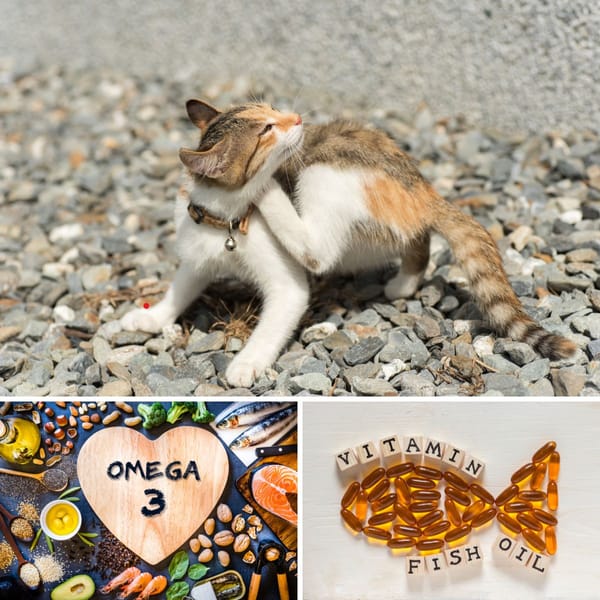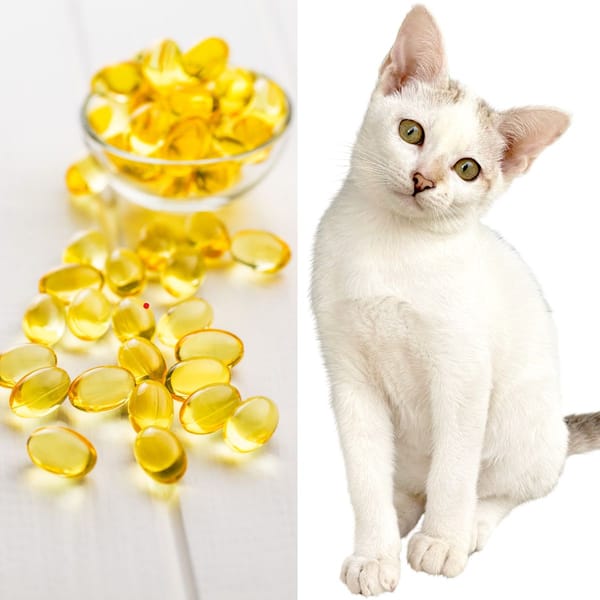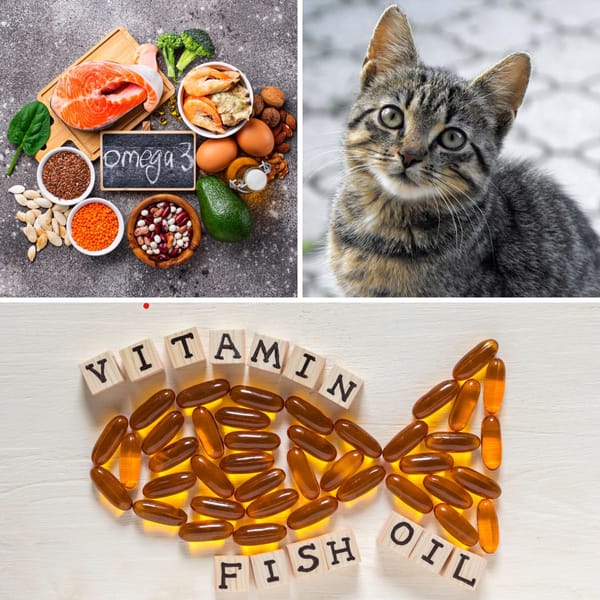Key Takeaways:
- Identifying the best fish oil for cats involves looking for products rich in essential fatty acids, specifically formulated for felines, and sourced from high-quality, wild-caught fish.
- The right fish oil supplement can support skin health, promote a shiny coat, enhance joint health, and contribute to overall immune system health.
- It's crucial to choose cat-specific fish oil supplements that are free from heavy metals and include the right balance of EPA and DHA for optimal health benefits.
Cats are beloved companions that bring joy and comfort to many households. As a pet owner, ensuring your cat's health and well-being is a top priority. One way to support your feline friend's health is by incorporating fish oil into their diet. Fish oil is rich in omega-3 fatty acids, which are essential for a cat's overall health, supporting everything from cognitive function to a shiny coat. But with so many options on the market, what brand of fish oil is best for cats? This article will dive into the details to help you make an informed decision.
Understanding Omega-3 Fatty Acids in Fish Oil
Omega-3 fatty acids, particularly eicosapentaenoic acid (EPA) and docosahexaenoic acid (DHA) are vital for maintaining a cat's health. They are known for their anti-inflammatory properties, which can aid in reducing joint pain and inflammatory bowel disease. Additionally, these fatty acids are crucial for brain and eye development, especially in younger cats.
The Importance of Fish Oil for Cats
Fish oil for cats is not just a trend; it's a crucial element in a balanced diet. It can help support skin health, preventing dry and itchy skin, and promoting a shiny coat. Moreover, fish oil supplementation can support heart health and contribute to a healthy immune system, which is particularly beneficial for cats with kidney disease or other health issues.
Selecting the Right Fish Oil Supplement
When choosing the right fish oil supplement for your cat, it's essential to consider the source of the fish oil. Wild Alaskan salmon oil is often recommended due to its purity and high levels of omega-3 fatty acids. It's also important to look for products that are specifically designed for cats, as human fish oil supplements may not have the correct dosage or essential nutrients that cats need.
The Role of Fish Oil in Joint Health
Joint health is a significant concern for many cat owners, especially as their pets age. The best fish oil supplements can provide essential fatty acids that help maintain joint flexibility and reduce the discomfort associated with joint pain. This is particularly important for cats that may be prone to conditions like arthritis.
Fish Oil and Coat Health
A shiny coat is a sign of a healthy cat, and fish oil plays a vital role in coat health. By supporting skin health and providing natural allergy relief, fish oil can help maintain a lustrous coat and prevent issues like excessive shedding or dandruff.
Fish Oil for Immune Health
A healthy immune system is crucial for a cat's ability to fight off illness and disease. Fish oil supplements can bolster the immune system, thanks to their rich content of omega-3 fatty acids. This can be especially beneficial for cats with compromised immune systems or those recovering from illness.
How Much Fish Oil Should You Give Your Cat?
Determining how much fish oil to give your cat depends on their body weight and specific health needs. It's essential to follow the recommended dosage on the fish oil product or consult with a veterinarian to ensure your cat is receiving the appropriate amount.
The Benefits of Liquid Fish Oil Supplements
Liquid fish oil supplements are often preferred by cat owners because they can be easily mixed into wet or dry food. This form of supplementation ensures that cats receive the full benefits of the fish oil without the hassle of administering pills or soft gels.
Fish Oil Versus Salmon Oil: What's the Difference?
When it comes to omega fish oil and salmon oil supplements, it's like comparing apples to oranges in the world of feline nutrition. Sure, they both fall under the umbrella of omega fatty acids, but there are nuances worth meowing about. Salmon oil, often touted for its purity, is derived specifically from—you guessed it—salmon. It's rich in omega-3 fatty acids and is known for its ability to promote healthy skin and a healthy coat. On the flip side, generic fish oils might be a blend from various sources, not always guaranteeing the same level of quality as high-quality fish oil from wild-caught Alaskan salmon.
Now, don't get your whiskers in a twist; both types of oil aim to support your kitty's health. However, salmon oil is often considered a step above because it's less processed and can boast a higher concentration of beneficial components. This means it could be more effective in maintaining dynamic health support, especially for your cat's skin and coat. But remember, whether you choose a broad-spectrum fish oil supplement or a specialized salmon oil for dogs (yes, it's great for cats too!), the goal is to ensure your feline friend's diet is enriched with essential fatty acids for optimal health.
Fish Oil and Allergies in Cats
Have you ever noticed your feline friend scratching incessantly or developing hot spots? It could be allergies, and guess what? Omega fish oil might just be the secret weapon you need. Rich in omega fatty acids, fish oil has anti-inflammatory properties that can help soothe your cat's irritated skin. By incorporating a high-quality fish oil supplement into your cat's diet, you're not just giving them a shiny coat; you're potentially reducing the itchiness and discomfort associated with allergic reactions. It's like hitting two birds with one stone – or should we say, helping two paws with one capsule!
But before you rush to the pet store, remember that not all supplements are created equal. Human supplements often contain additives that may not be safe for your kitty. So, when you're on the hunt for that perfect omega fish oil, make sure it's formulated specifically for cats. This ensures that your furry friend gets the right dose and the purest form of fish oil, without any unwanted extras. After all, your cat's health is paramount, and choosing the right supplement can make all the difference in managing those pesky allergies.
Fish Oil and Digestive Health in Cats
When we talk about a cat's health, we often overlook the importance of digestive health. But did you know that omega fish oil can play a significant role here too? The anti-inflammatory properties of omega fatty acids can help soothe an irritated digestive tract, making it easier for your furry friend to process their food. This is especially beneficial for cats with sensitive stomachs or conditions like inflammatory bowel disease.
Adding high-quality fish oil to your cat's diet may also aid in nutrient absorption. The healthy fats in fish oil can help your cat's body absorb fat-soluble vitamins more efficiently, which is crucial for maintaining overall health. Plus, a smoother digestive process means fewer hairballs – and that's something both you and your cat can appreciate!
Fish Oil and Behavioral Health
Did you know that the benefits of fish oil go beyond just the physical aspects of your cat's health? Omega fatty acids are also champions for your cat's brain, supporting cognitive function and potentially promoting better behavior. Cats, much like humans, can experience stress and anxiety, which can manifest in unwanted behaviors. Incorporating omega fish oil into their diet can help support brain health and lead to a more relaxed and content feline.
Moreover, studies have suggested that omega fatty acids can have a positive impact on mood and even help with conditions like depression in humans. While more research is needed for cats, the potential is there. A cat with a balanced diet that includes high-quality fish oil might just be a happier, more playful companion. So, if you're looking to boost your cat's mood, consider the brain-boosting power of fish oil!
Fish Oil and Heart Health in Cats
Let's talk about the heart of the matter – your cat's heart health. Omega fish oil is like a love letter to your cat's cardiovascular system. The omega fatty acids in fish oil are known to support heart health, keeping that tiny ticker ticking smoothly. By adding a salmon oil supplement to your cat's diet, you're not just pampering them; you're promoting their overall well-being. Wild-caught Alaskan salmon oil is often touted as one of the best sources of omega fatty acids, so keep an eye out for that on the label.
Now, you might be thinking, "Can't I just share my omega supplements with my cat?" Hold that thought! Your cat's needs are different from yours, and what works for you might not be ideal for them. High-quality fish oil supplements designed for cats will have the correct balance of nutrients to support their heart without the risk of overdoing it. Plus, they're often flavored to please even the pickiest of palates. So, when it comes to your cat's diet and heart health, think of fish oil as the guardian angel, silently but effectively guarding against heart issues.
The Synergy of Fish Oil and Antioxidants in Feline Diets
Diving deeper into the world of catfish oil supplements, let's not overlook the power of antioxidants. Picture this: you're adding a liquid fish oil supplement to your cat's diet for immune system support and anti-inflammatory properties. But there's a catch – fish oil can oxidize, and when it does, it's not as effective. That's where antioxidants like Vitamin E come into play. They're like the guardians of the galaxy for your cat's health, protecting the integrity of the oil and ensuring your cat reaps all the benefits.
But wait, there's more! Antioxidants do double duty by also supporting your cat's overall well-being. They work in tandem with omega fatty acids to support healthy skin, promote healthy skin, and even support brain health. It's like a dynamic duo where each hero enhances the other's powers. So, when you're perusing the aisles for that perfect cat's diet addition, consider a supplement that combines fish oil with antioxidants. It's not just about adding a splash of oil; it's about creating a holistic approach to your cat's health that supports everything from brain function to bone health.
Fish Oil and Kidney Health
Kidney health is a common concern in cats, particularly as they age. Fish oil can support kidney function by reducing inflammation and providing essential nutrients that help maintain kidney health.
The Best Fish Oil Brands for Cats
When it comes to the best fish oil brands for cats, there are several reputable options to consider. Brands like Zesty Paws and iHeartDogs Salmon Oil are known for their high-quality ingredients and commitment to pet health. Look for products that contain wild-caught Alaskan salmon or Pollock oil for the highest quality.
Fish Oil and Cognitive Function
Fish oil isn't just beneficial for physical health; it also supports cognitive function in cats. The omega-3 fatty acids found in fish oil can help maintain brain health, which is particularly important for aging cats that may be at risk for cognitive decline.
The Safety of Fish Oil Supplements
Safety is a top concern when it comes to supplements for your cat. High-quality fish oil products are tested for heavy metals and other contaminants to ensure they are safe for your pet. Always choose products from reputable brands that adhere to strict quality standards.
Incorporating Fish Oil into Your Cat's Diet
Adding fish oil to your cat's diet can be done seamlessly by choosing a liquid food supplement designed for easy mixing. Whether your cat prefers wet or dry food, the right fish oil supplement can be incorporated without disrupting their regular feeding routine.
Fish Oil and Inflammatory Diseases
Fish oil's anti-inflammatory properties make it an excellent supplement for cats with inflammatory diseases such as inflammatory bowel disease. By reducing inflammation, fish oil can help alleviate symptoms and improve the quality of life for affected cats.
The Role of Vitamin E in Fish Oil Supplements
Vitamin E is often added to fish oil supplements to prevent oxidation and preserve the quality of the oil. It's also an essential vitamin for cats, supporting their immune system and overall health.
Conclusion: Choosing the Best Fish Oil for Your Cat
Selecting the best fish oil for your cat requires careful consideration of the product's source, formulation, and quality. By choosing a high-quality, cat-specific fish oil supplement, you can support your cat's health in numerous ways, from maintaining a shiny coat to promoting joint health and cognitive function.
Summary
In summary, the best fish oil for cats is one that is rich in essential fatty acids, specifically formulated for felines, and sourced from high-quality, wild-caught fish. Supplements like Solid Gold Fish Oil and iHeartDogs Salmon Oil stand out for their quality and effectiveness. Always consult with a veterinarian to determine the appropriate dosage for your cat's specific needs and ensure the supplement is integrated into their diet safely.
FAQ Section
Q: Can I give my cat human fish oil supplements? A: It's not recommended to give cats human fish oil supplements as they may contain different concentrations of omega-3 fatty acids and additional ingredients that are not suitable for cats. Always choose fish oil supplements specifically designed for felines.
Q: How do I know if my cat needs fish oil in their diet? A: Signs that your cat may benefit from fish oil supplementation include dry and itchy skin, a dull coat, joint pain, or general signs of inflammation. Consult with a veterinarian to determine if fish oil is right for your cat.
Q: Are there any side effects of giving fish oil to cats? A: While fish oil is generally safe for cats, some may experience side effects such as diarrhea or a fishy odor. Starting with a small dose and gradually increasing it can help minimize potential side effects. If you notice any adverse reactions, consult with your veterinarian.







